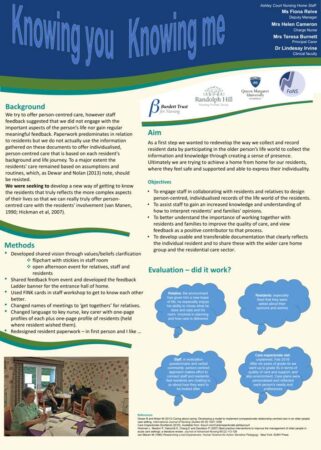Home Resources Project Reports Knowing you, knowing me
Knowing you, knowing me
| Leader(s) | Lindesay Irvine, Fiona Reeve, Helen Cameron and Teresa Burnett |
| Location | Ashley Court Nursing Home, Edinburgh |
| Duration | December 2016 -January 2019 |
| Received for Publication | January 2019 |
Ashley Court is a 52 Bed Nursing Home in Edinburgh where we offer long term nursing care for frail older people, with dedicated care for people living with dementia and/or end of life care. We also offer short term and respite facilities for older people.
Aim of the project
To re-develop the way we gather and record resident information/data. We wanted to achieve a person-centred approach to collecting the information and to generate knowledge by participating in the older person’s (resident’s) life world, creating a collaboration between the older person and the carers. Ultimately we are trying to achieve a ‘home from home’ for our residents where they feel safe, supported and able to express their individuality.
Methods and Approaches
The project used a narrative based approach to develop a flexible and creative assessment of the resident’s needs and thus provide a foundation for a plan of care with redesign of required documentation. Integral to this is valuing views of older people (residents) as a basis for decision-making and assessment as a continuous process that allows a picture of the older person’s current situation, past experiences, perspectives and desires to emerge.
To achieve this we used experience based co-design approach which brings service users and staff together to share in the role of improving and developing care delivery (Kings Fund, 2013). As we wanted to engage residents, families and care staff in promoting a better care service, Dewing et al. (2014) suggests use of a four stage method (NHS Institute for Innovation and Improvement) to enable service improvement.
Using this methodology we explored our current practices, identified barriers and issues related to the care delivered currently, developed a new approach to resident assessment and on-going care support with appropriate documentation and finally evaluated changes to the care planning approach and documentation (Manley et al., 2008; McCance et al., 2013; Buckley et al., 2014).
Conclusion
The embedding of person-centred practices within the care home has begun with many more staff and residents working together to achieve a person-centred environment.
Since concluding the formal part of the project, further person-centred practices have evolved – a prime example being that all residents were asked by their key carer, what they would like to receive as a Christmas gift from the care home. This allowed each resident to have a personal gift bought for them by either the key carer or the management team rather than the previous approach of all getting a similar gift.
This project was supported by Patients First, a partnership programme with the Burdett Trust for Nursing.
Comments are closed.


